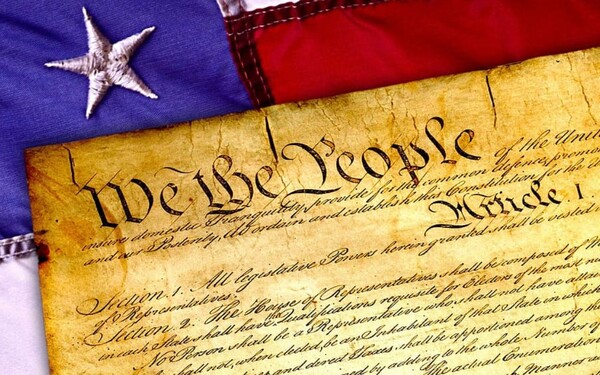
(function(d, s, id) { var js, fjs = d.getElementsByTagName(s)[0]; if (d.getElementById(id)) return; js = d.createElement(s); js.id = id; js.src = “https://connect.facebook.net/en_US/sdk.js#xfbml=1&version=v3.0”; fjs.parentNode.insertBefore(js, fjs); }(document, ‘script’, ‘facebook-jssdk’)); –>
–>
January 30, 2024
I just received one of my daily emails from “Justia Verdict,” a legal blog. In it, Dean Falvy lays out a number of legal questions regarding the Supreme Court case to resolve the Colorado effort to remove Donald Trump from the ballot. His leftist leanings should not be surprising, given his legal heritage in the Poison Ivy League (Harvard) and position on the Left Coast (University of Washington). Twice he is unable to hide his prejudice and says the quiet part out loud.
‘); googletag.cmd.push(function () { googletag.display(‘div-gpt-ad-1609268089992-0’); }); document.write(”); googletag.cmd.push(function() { googletag.pubads().addEventListener(‘slotRenderEnded’, function(event) { if (event.slot.getSlotElementId() == “div-hre-Americanthinker—New-3028”) { googletag.display(“div-hre-Americanthinker—New-3028”); } }); }); }
If they overturn the Colorado decision on dodgy technical grounds (for example, by excluding the presidency from the scope of the word “office”), they risk their own credibility, while dismantling an important constitutional guardrail[.]
In the sequel to this article … I will also consider the possibility, however slim, that the Court will see Sec. 3 of the 14th Amendment for what it is — a necessary tool to protect the Constitution from its known enemies — and apply it accordingly.” [Emphasis added in both quotes. Translation: Trump is an enemy of the Constitution.]
The egregious bias in that concluding statement should require no further comment. But Falvy’s analysis substitutes emotional ranting for actual legal scholarship and critical thinking. I may not have his law school credentials, but I believe it’s time to explain something he seems to misunderstand about the English language that was used to write the Constitution.
‘); googletag.cmd.push(function () { googletag.display(‘div-gpt-ad-1609270365559-0’); }); document.write(”); googletag.cmd.push(function() { googletag.pubads().addEventListener(‘slotRenderEnded’, function(event) { if (event.slot.getSlotElementId() == “div-hre-Americanthinker—New-3035”) { googletag.display(“div-hre-Americanthinker—New-3035”); } }); }); }
Contrary to the common rants about how the Founders were antiquated in their thinking and couldn’t possibly understand our legal concerns, most were highly educated, with a considerable number studying law at prestigious institutions. They were extremely deliberate, often discussing word choices at length. Put bluntly, they knew what they were doing, and why they were doing it. That’s why it took them almost four months to craft a 4,400 word document. That’s the size of an ordinary chapter in many books. While the drafters of the Fourteenth Amendment may not have been quite as distinguished, they were also very careful, and fully aware of the document they were amending.
The key words in Falvy’s screed are “office” and “officer.” To illustrate, imagine that you are “invited” to the Internal Revenue Service for an audit. You will enter the IRS “office” and go through the process with an “officer.” The “office” is the position, and the “officer” is the person. That’s the basic lexicon, and this is how these words are used over forty times in the Constitution. But there’s one key difference in the way the terms are used in a few places. Those differences come with what are known in grammar as “modifiers.” These are phrases that add specific meaning. Again, we must illustrate.
My wife and I drive cars. Hers is silver, and mine is burgundy. Her car is different from “cars” by being identified in more exact language. My burgundy Honda is now even more exactly specified. Adding “under the United States” to “office” or “of the United States” to “officer” is a way of describing them more exactly so that they cannot be confused with similar but less exact terms. Continuing with our grammar lesson, the less exact form is often used in the Constitution for a simple reason. There are a lot of places where a person is described as holding a specific position. In those cases, there’s no reason to add extra language because it would add words without adding meaning. Modifiers are used in the Constitution when their additional meaning is important. So it’s time to look at those modifiers.
“Officer(s) of the United States” occurs four times (Art II, § 2, Cl. 2; Art II, § 3; Art II, § 4; Amend XIV, § 3). “Office… under the United States” occurs six times (Art I, § 3, Cl. 7; Art I, § 6, Cl. 2; Art I, § 9, Cl. 8; Art II, § 1, Cl. 2; Art VI, Cl. 3; Amend XIV, § 3). That’s it. Since these modifiers show up twice in Section 3 of the Fourteenth Amendment, we have to go to the other eight spots to figure out what they mean. After all, the Congress that folded, spindled, and mutilated draft after draft of the Fourteenth Amendment to get it “just right” wasn’t about to change the meaning of the language. They were using the existing Constitutional language to get their meaning just the way they wanted it.
Before we move on to the specifics, let’s brush by some common uses. Congress elects its own “officers” (Art I, § 2, Cl. 5). Article I, § 3, Cl. 5 speaks of the “Office of President” being filled by a substitute in the absence of the President and Vice President. These are non-technical, vernacular uses of “office” and “officer.” Clause 7, the Impeachment Clause, starts the same way, but notes a conviction can result in disqualification from holding “any Office… under the United States.” Welcome to Falvy’s “dodgy technical grounds.” Let’s start at the beginning.
“Officer(s) of the United States” are appointed by the President.
‘); googletag.cmd.push(function () { googletag.display(‘div-gpt-ad-1609268078422-0’); }); document.write(”); googletag.cmd.push(function() { googletag.pubads().addEventListener(‘slotRenderEnded’, function(event) { if (event.slot.getSlotElementId() == “div-hre-Americanthinker—New-3027”) { googletag.display(“div-hre-Americanthinker—New-3027”); } }); }); } if (publir_show_ads) { document.write(“
[H]e shall nominate, and by and with the Advice and Consent of the Senate, shall appoint Ambassadors, other public Ministers and Consuls, Judges of the supreme Court, and all other Officers of the United States[.]
The President nominates or appoints a specific list of Officers “and all other Officers of the United States.” This isn’t open to interpretation. The President nominates every “officer of the US.” He does not nominate himself. Continuing on, the President “shall Commission all the Officers of the United States.” (Art II, § 3). Once again, the President does not commission himself. Grammatically, this clause excludes the President from being an “officer of the US.”
The last use of this term before the Fourteenth Amendment is in Article II, Section 4.
The President, Vice President and all civil Officers of the United States, shall be removed from Office on Impeachment for, and Conviction of, Treason, Bribery, or other high Crimes and Misdemeanors.
This clause shines a brilliant light on the meaning of the two uses of “office” I mentioned earlier. The list of “President, VP, and all civil Officers” (not military) makes it abundantly clear that the President and VP are not “civil officers.” Scalia’s Canons of Legal Construction point out that “and” joins two different groups together. But both “civil officers of the US” and the President and VP can be “removed from office” by impeachment and conviction. In other words, their nameplate leaves the desk.
Moving down to “Offices… under the US,” there are four clauses to check. The first one is the complement to what we just saw.
Judgment in Cases of Impeachment shall not extend further than to removal from Office, and disqualification to hold and enjoy any Office of honor, Trust or Profit under the United States. (Art I, §3, Cl. 7)
Unfortunately, this clause does not help us define the term. It is being used as an “understood term.” Since the Founders considered themselves English subjects until the Revolution, this is almost certainly the source for this language. “Under the US” is an adaptation of “under the Crown” in English law. The King was the Crown, and he appointed all subordinates who were “officers under the Crown.”
The Ineligibility Clause (Art I, § 6, Cl. 2) gives us our first bit of help. Senators and Representatives can’t be “appointed to any civil office under the Authority of the United States,” and if they hold such an office, they have to give it up if they’re elected to the House or Senate. Civil offices “under the US” are appointed positions, and the President isn’t appointed. It also says something that becomes important later on. Senators and Congressmen can’t accept offices where the “emoluments,” or pay has been increased. Section 9, clause 8 says “no Person holding any Office (under the US) can accept any present, Emolument…” from any foreign government. In short, they can’t be salaried by foreigners. The Electors clause (Art II, § 1, Cl. 2) uses the same language, and offers no more help. The Congressional Oath clause (Art VI, Cl. 3) is more of the same.
An “officer of the United States” is appointed by the President, who logically cannot be such an officer. In fact, this is the point made by Joseph Story in his 1833 Commentaries on the Constitution (259-60). The President “derives his office from a source paramount to the national government.” The President, VP, and Congress are the United States for purposes of Constitutional interpretation. The drafters of the Fourteenth Amendment knew this and agreed. The term “office under the US” simply describes an office held by delegated authority from the President and Congress. Thus, Section 3 of the Fourteenth Amendment does not apply to Donald Trump.
The grammar of the Constitution is very clear. “Offices under the US” are filled by “officers of the US,” who are appointed, not elected, officials.
Ted Noel, M.D. is a retired anesthesiologist/intensivist who podcasts and posts on social media as DoctorTed and @vidzette. His Doctor Ted’s Prescription podcasts are available on many podcast channels.

Image via Pxfuel.
<!–
–>
<!– if(page_width_onload <= 479) { document.write("
“); googletag.cmd.push(function() { googletag.display(‘div-gpt-ad-1345489840937-4’); }); } –> If you experience technical problems, please write to [email protected]
FOLLOW US ON
<!–
–>
<!– _qoptions={ qacct:”p-9bKF-NgTuSFM6″ }; ![]() –> <!—-> <!– var addthis_share = { email_template: “new_template” } –>
–> <!—-> <!– var addthis_share = { email_template: “new_template” } –>




